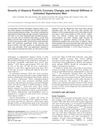 38 citations,
November 2013 in “Journal of The American Academy of Dermatology”
38 citations,
November 2013 in “Journal of The American Academy of Dermatology” Higher BMI links to worse hair loss in Taiwanese men.
 May 2023 in “Bali Medical Journal”
May 2023 in “Bali Medical Journal” Higher sebum levels are linked to more severe male baldness.
 August 2024 in “Archives of Dermatological Research”
August 2024 in “Archives of Dermatological Research” Acne severity is not related to the type or severity of androgenetic alopecia.
 5 citations,
July 2016 in “Journal of Clinical Hypertension”
5 citations,
July 2016 in “Journal of Clinical Hypertension” Men with severe early-onset baldness may have worse heart artery function and stiffer arteries if they have high blood pressure.
 July 2023 in “Dermatology practical & conceptual”
July 2023 in “Dermatology practical & conceptual” The machine learning model effectively assesses the severity of hair loss and could help dermatologists with treatment decisions.
4 citations,
December 2021 in “Journal of Cosmetic Dermatology” Severe hair loss is linked to worse COVID-19 outcomes, especially in younger men.
 4 citations,
January 2016 in “Annals of Dermatology”
4 citations,
January 2016 in “Annals of Dermatology” More severe hair loss links to thicker heart fat, suggesting possible heart disease risk.
 January 2016 in “Ankara Üniversitesi Tıp Fakültesi mecmuası”
January 2016 in “Ankara Üniversitesi Tıp Fakültesi mecmuası” Severe hair loss (androgenetic alopecia) is linked to higher risk of heart disease (cardiovascular atherosclerosis).
 21 citations,
May 2017 in “International Journal of Dermatology”
21 citations,
May 2017 in “International Journal of Dermatology” Overweight smokers have worse hair loss.
 4 citations,
May 2021 in “Journal of The European Academy of Dermatology and Venereology”
4 citations,
May 2021 in “Journal of The European Academy of Dermatology and Venereology” Hair loss doesn't affect COVID-19 severity.
November 2021 in “International Journal of Trichology” Low PON1 levels may indicate and predict the severity of hair loss.
October 2021 in “Case Reports in Dermatology” Patients and doctors often differ in assessing hair loss severity, so treatment should be personalized.
December 2022 in “The Aging Male” Lower 2D:4D ratio and older age increase the risk of severe hair loss in men.
3 citations,
December 2021 in “Journal of Cosmetic Dermatology” Androgenetic alopecia severity does not affect COVID-19 severity.
January 2018 in “프로그램북(구 초록집)” No link between hair loss severity and PSA levels in men.
 4 citations,
August 2020 in “Journal of The American Academy of Dermatology”
4 citations,
August 2020 in “Journal of The American Academy of Dermatology” Hair loss link to COVID-19 severity likely due to other factors.
 June 2024 in “Benha Journal of Applied Sciences”
June 2024 in “Benha Journal of Applied Sciences” β1 integrin may indicate and influence the severity of hair loss in androgenetic alopecia.
 March 2024 in “Skin research and technology”
March 2024 in “Skin research and technology” New dermoscopic criteria accurately diagnose and grade the severity of hair loss in androgenetic alopecia.
 1 citations,
January 2017 in “International Journal of Dermoscopy”
1 citations,
January 2017 in “International Journal of Dermoscopy” Digital imaging can effectively evaluate the donor area for hair transplants, showing variations in hair density and grouping by age and severity of hair loss.
May 2022 in “Dermatology practical & conceptual” Trichoscopy is crucial for diagnosing and managing androgenetic alopecia, showing increased vellus hairs, empty follicles, and fibrosis with severity.
 32 citations,
July 2020 in “Journal of The American Academy of Dermatology”
32 citations,
July 2020 in “Journal of The American Academy of Dermatology” AGA linked to worse COVID-19 outcomes in men.
1 citations,
February 2021 in “Benha Journal of Applied Sciences” Higher IMA levels in male AGA patients, especially if obese, may link AGA to metabolic and heart issues.
 3 citations,
June 2016 in “Dermatology Reports”
3 citations,
June 2016 in “Dermatology Reports” Finger length ratios don't predict baldness in men.
 2 citations,
January 2020 in “Journal of The European Academy of Dermatology and Venereology”
2 citations,
January 2020 in “Journal of The European Academy of Dermatology and Venereology” Balding men have harder scalps.
 March 2024 in “Healthcare”
March 2024 in “Healthcare” Stem cell treatment improved life quality and sexual function in women with hair loss.

Men with male pattern baldness are more likely to have unhealthy blood lipid levels, which could signal other health issues.
 September 2023 in “Clinical, Cosmetic and Investigational Dermatology”
September 2023 in “Clinical, Cosmetic and Investigational Dermatology” Higher SHBG levels are linked to less severe hair loss in women, but vitamin D levels don't seem to affect hair loss.
February 2023 in “Cureus” Male pattern baldness in medical students is linked to higher depression, loneliness, and internet addiction.
January 2014 in “Journal of Clinical Dermatology” Topical minoxidil improves life quality for women with hair loss.
 16 citations,
October 2020 in “Lipids in Health and Disease”
16 citations,
October 2020 in “Lipids in Health and Disease” Leptin affects skin and hair health and may worsen some skin conditions, but more research is needed to understand its full impact.




















